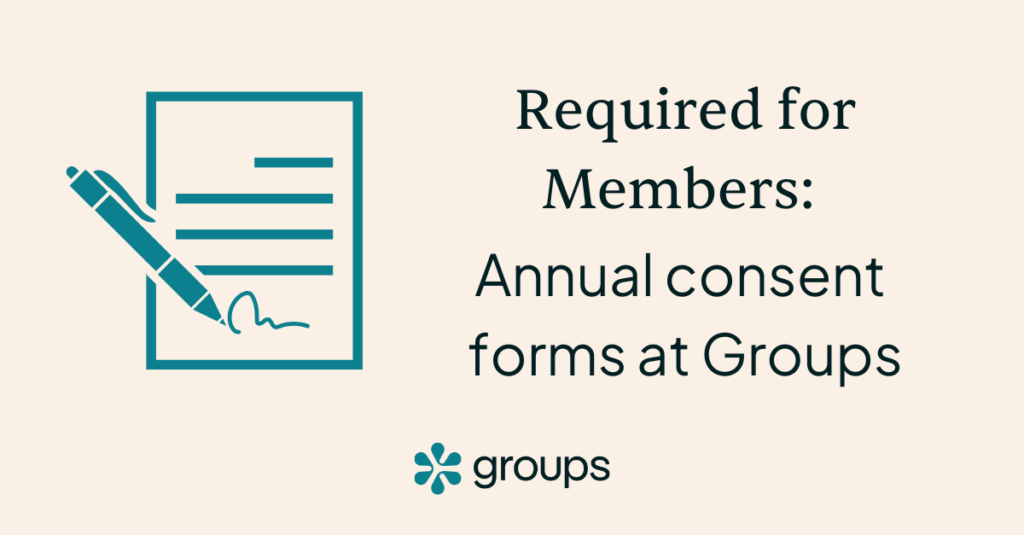Every year, Groups members are asked to review and sign updated forms. These forms help us stay current with the law and our policies and make sure we continue giving you the best care possible.
Don’t worry — they won’t take long, and your care team will be there to help every step of the way.
Why Am I Being Asked to Sign New Forms?
Some forms expire each year and need to be renewed. Others have been updated to reflect changes in policies or laws. You’ll only be asked to sign the forms that apply to your treatment.
When Will I Get the Forms?
It depends on when you joined Groups:
- If you joined before January 2025, you’ll get the forms on the morning of your first scheduled group next week (starting April 14, 2025).
- All members will see additional forms on the morning of your first scheduled group during the week of June 9th. (We’ll send you a reminder closer to the date!)
How can I sign?
The easiest way to sign them is right through the Groups app! Your care team can help answer any questions you have during Group. You will also get reminders via text and email, but you only have to sign once!
What Forms Will I Be Asked to Sign?
If you joined Groups before January 2025, you’ll be asked to sign two forms during the week of April 14:
- Consent to Electronic Communication
This form gives Groups permission to contact you by text and email. Messages may include reminders, updates, feedback requests, and other important info. It now covers all phone numbers and email addresses you’ve given us — not just the one written on the form. If there’s a number or email you no longer want us to use, just let your care team know. - TPO Consent Form
TPO stands for Treatment, Payment, and Healthcare Operations. This form is a type of Release of Information (ROI) that gives Groups permission to share your information when needed for coordinating your care, working with your insurance, and managing services that support your treatment. It helps us avoid asking you to sign multiple releases for common types of communication. If there’s a provider or contact you don’t want us to talk to, just let us know. We’ll note it in your chart.
- What is not covered by the TPO consent form? You’ll still need a separate ROI (Release of Information) to share information with: probation or parole officers, family or friends (unless it’s for billing), your emergency contact, your employer, bureau of motor vehicles, Depart of Children Services, Lawyers or courts. We’ll always let you know before sharing your information — even in many cases when it is covered by the TPO.
- What If I Don’t Want to Sign the TPO? We strongly encourage all members to sign the TPO Consent because it helps us coordinate your care, work with your insurance, and respond to audits and bliing questions. If you don’t want to sign the TPO, you’ll need to sign an individual ROI for each provider or insurance company we may need to contact. Without an ROI for your insurance provider, we may not be able to continue your treatment — but we’ll work with you to explore other options if needed.
What Forms Will All Members Be Asked to Sign?
All members will be asked to sign three additional forms during the week of June 9:
- Consent to Treat
This form is your agreement to receive care from Groups. It includes information about financial and complaint policies, telehealth services, and your rights as a client. Both you and your counselor will sign this form. - Shared Medical Visit Release
This gives permission for shared provider visits and shared information during visits. It does not allow other members to see your records. The expiration period has been extended from 12 months to 30 months. - Financial Consent
This form includes updates to our self-pay policy and helps us clearly explain your financial rights and responsibilities.
What If I Don’t Want to Sign the Forms?
Some of these forms are required for your continued treatment at Groups. If you choose not to sign them, your care team can talk with you about other treatment options.
Have questions? Your care team is here to help anytime.
Final Thoughts
We know paperwork isn’t the most exciting part of recovery, but these forms help us continue providing you with safe, high-quality care. If you have any questions or concerns, don’t hesitate to reach out to your care team — we’re here for you.




